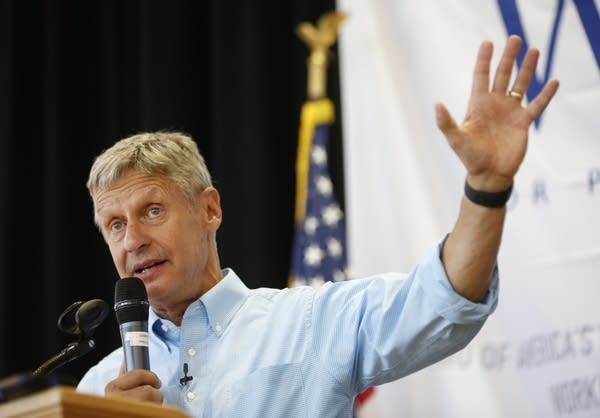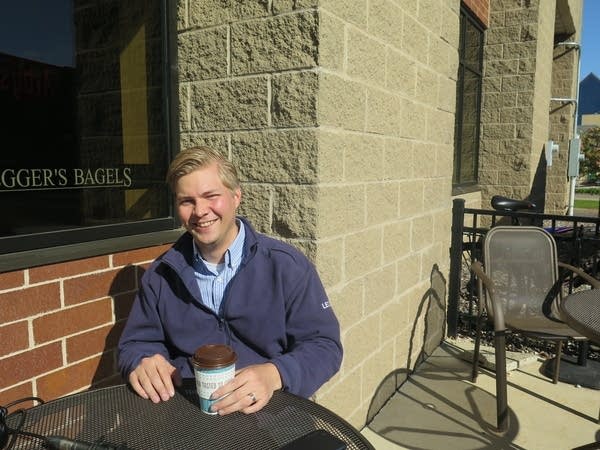Fed up with campaign, some voters seek alternatives

Go Deeper.
Create an account or log in to save stories.
Like this?
Thanks for liking this story! We have added it to a list of your favorite stories.
Chris Dock can tell when there's been another ugly moment in the presidential race. Phone calls pick up and so does Facebook activity for the Minnesota Libertarian Party, which Dock chairs.
And lately, he says, there's been a lot of interest as some right-of-center voters in particular decide they can't stomach Republican Donald Trump.
"We're seeing a lot more traction of people who are looking for another option," Dock said. "So obviously we're talking about them about Gary Johnson and there is another option. And it's a sane option, both from a policy perspective and from a personality perspective."
Johnson is the former Republican governor of New Mexico. He was the Libertarian nominee four years ago, too, and received about 1 percent of the Minnesota vote.
Turn Up Your Support
MPR News helps you turn down the noise and build shared understanding. Turn up your support for this public resource and keep trusted journalism accessible to all.
Another ballot repeat is the Green Party's Jill Stein, who garnered less than one half of 1 percent of Minnesota's votes in 2012.

Minnesota Green Party Chairman Brandon Long is convinced she'll do much better this time.
He expects Stein to attract votes from people who backed Vermont Sen. Bernie Sanders in the nomination contest but haven't warmed up to Hillary Clinton as the Democratic candidate.
"Bernie Sanders was somebody that really ignited a lot of interest," Long said. "A lot of people who particularly were independent in the first place, he brought them into the [Democratic] Party. And then they're not really feeling appreciated or wanted, and so a lot of people are saying, 'Look, we need another option,' and Jill Stein and the Green Party is it."
In all, there are nine choices for Minnesota voters in the presidential race. There are candidates from the Constitution Party, the Legal Marijuana Now Party, the Socialist Workers Party and the American Delta Party.
The Independence Party is represented on the ballot by Evan McMullin, a former congressional staffer and CIA operative whom polls show is within striking distance in Utah. McMullin isn't on every state's ballot, but he's got some politically savvy backers in Minnesota.
Harry Niska is one of them. The lawyer from Ramsey is very active in state Republican politics. But he's very opposed to Trump as the nominee because of what he calls Trump's lack of principles and moral character.

"I worked very hard, I did everything I knew to do to prevent the party from making what I think was a historic mistake," Niska said
Niska says he views McMullin as a credible alternative. But he's getting grief from other Republicans.
"A lot of my friends are frustrated with me and they either wish I'd get on board or be quiet. And I understand that, frankly," he said. "I wish I could support the Republican nominee for president and it's extraordinarily frustrating and frankly angering to me that I can't."
If any of the alternative candidates wins 5 percent of the vote, their parties will become major parties in Minnesota. That entitles them to automatic ballot access and campaign subsidies heading into an all-important 2018, when the governor's office and a Senate seat are up.
Away from the presidential race, Tim Sherno is betting that discontent carries down the ballot. The former TV newscaster is trying to elbow his way into the picture in Minnesota's 3rd Congressional District — as a write-in candidate.

Sherno has been knocking on doors and telling voters to rebuke both incumbent Republican Erik Paulsen and Democratic challenger Terri Bonoff. Their race has drawn millions of dollars, flooding mailboxes and television programs with negative ads.
"With the political dissatisfaction that's out there, I'm sitting on top of a tinder-dry pile of voter anger and I'm just throwing matches out there," Sherno said.
Sherno is running a shoestring campaign paid for from his own pocket. But his challenge is much greater than most races with extra options: People have to remember and write his name — or something close to it — for him to get their vote.


